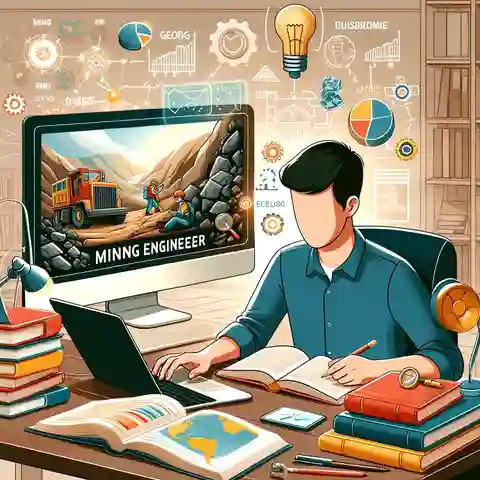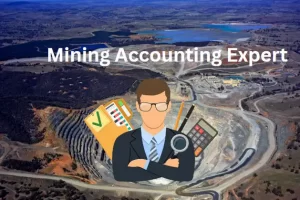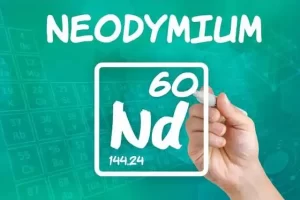How to become a mining engineer – Mining engineers are like treasure hunters. They design safe and smart ways to find valuable stuff hidden deep underground – things like gold, coal, and the materials needed to build our phones and computers! Here’s how YOU can become one:
How to Become a Mining Engineer – Educational Requirements
To become a mining engineer, you’ll need to arm yourself with the right knowledge and skills. Here’s the educational path to reach your goal:
Bachelor’s Degree: The Foundation
- Major Matters: The most direct route is to earn a bachelor’s degree specifically in mining engineering. If your school doesn’t offer that, focus on closely related fields like civil engineering or geological engineering.
- Accreditation is Key: Look for programs with ABET accreditation. This stamp of approval means the program meets high quality standards recognized by the industry.
- What You’ll Learn: Expect a deep dive into subjects like math, physics, geology, how to design safe mines, and the rules and regulations about protecting the environment.
Internships/Co-ops: Gaining Real-World Power
- Experience = Advantage: While you’re still in school, try to snag internships or co-op positions at mining companies. This hands-on experience is like bonus points on your resume when you start looking for a full-time job after graduation.
Graduate Programs (Optional): Level Up Your Skills
- Master the Field: A master’s degree isn’t always required, but it can open up more doors. Consider a master’s if you want to manage projects or become an expert in a super-specific area of mining.
Key Points to Emphasize:
- The path to becoming a mining engineer starts with a solid college education.
- Relevant majors and coursework build the essential knowledge base.
- Practical experience through internships is just as valuable as what you learn in the classroom.
- Advanced degrees can offer specialization and career growth opportunities..
How to Become a Mining Engineer – Licensure/Certification
licenses and certifications as unlocking the highest levels of your mining engineering career. Here’s what you need to know:
Fundamentals of Engineering (FE) Exam: The Early Advantage
- Why Take It Soon: Passing the FE exam while you’re still in school or fresh out of college shows that you have a strong grasp of all the engineering basics. Many consider it the first step towards becoming a fully licensed engineer.
- What It’s Like: The FE exam is a computer-based test covering all sorts of engineering knowledge, kind of like a final exam for your entire degree.
Professional Engineer (PE) License: The Official Seal
- Requirements: Getting your PE license is a big deal! You can’t do it right after college. You’ll need:
- A degree from an accredited program
- Several years of work experience under another licensed engineer
- To pass another tough exam
- State-by-State (and Country-by-Country): Always check the rules for the state or country where you want to work.
Why Bother With Licensing?
- Project Power: Many projects need the stamp of approval from a licensed PE. If you want to lead teams and be in charge of major mining operations, this license is often a must.
- Career Boost: Having a PE license shows employers you’re serious about your profession, and it could lead to better job opportunities and higher pay.
How to Become a Mining Engineer – Key Skills Development
Beyond the classroom and exams, top-notch mining engineers have a special toolkit of skills. Here’s what you’ll want to master:
Technical Skills
- Software Savvy: Get familiar with special computer programs used for designing mines (CAD) and creating models of the underground environment. They’re like your high-tech mining superpowers!
- Math & Science Master: A strong foundation in math and science will help you solve all kinds of mining problems, from calculating safe tunnel sizes to figuring out the best way to extract valuable minerals.
- Geology Genius: Knowing how rocks, minerals, and the whole Earth system works is key for finding resources and designing mines that won’t damage the environment.
Problem-Solving Skills
- Challenge Conqueror: Mines are full of unexpected puzzles. You’ll need to be able to spot problems, think outside the box for solutions, and make smart decisions.
- Critical Thinker: Analyzing information, understanding complex systems, and figuring out the safest and most efficient ways to operate a mine will be your daily mission.
Communication & Collaboration Skills
- Team Player: Mining engineers work with everyone from geologists to heavy equipment operators. Being able to explain your ideas clearly and work together effectively is super important.
- Presentation Power: You might need to present your plans and findings to company leaders or other important people. Practice explaining technical stuff in a way that’s easy to understand.
Important Note: These skills aren’t just something you learn in school. You’ll keep developing them throughout your career as you tackle new challenges and gain experience!
Job Search and Career Growth

Once you’ve got the education and skills, it’s time to land that awesome job and start your journey as a mining engineer!
Where to Find Jobs
- The Digital Dig: Start with classic online job boards and search specifically for mining engineering positions. Also, check out the websites of big mining companies – they often have a “careers” section.
- Professional Power: Join professional associations for mining engineers. These groups have job postings, networking events, and all sorts of resources to help with your job search.
Importance of Networking
- Making Connections: Attend industry events, connect with professors and alumni from your college program, and join online groups for mining engineers. You never know who might know about the perfect job opening for you!
Advancement Opportunities
- Climbing the Ladder: With experience, you could move into management positions, leading teams and overseeing entire mining projects.
- Technical Specialist: Become an expert in a specific area, like blasting, ventilation, or the latest mining technologies.
- Consultant Power: Use your experience to help many different mining companies by becoming an independent consultant.
Key Things to Remember:
- The job market for mining engineers can change depending on the economy and demand for resources. Keep up with industry news and trends.
- Be patient and persistent in your job search. Landing your first job might take time, but once you’re in, the possibilities are exciting!
- Never stop learning! The mining industry is always evolving with new technology and methods.
Why Get a Master’s Degree in Mining Engineering?
Think of a master’s degree as a special tool for mining engineers. It helps you become an expert and can make your job even cooler! Here’s why:
- Become the Best at One Thing: A master’s degree lets you choose a super-specific part of mining to get really good at, like making mines safer or finding new ways to protect the environment.
- Be the Boss: Mining companies need leaders. A master’s degree teaches you how to manage projects and teams, so you can climb the ladder.
- Learn Future Tech: Graduate school is where you learn about the newest tools and ideas in mining. This gives you an advantage when looking for jobs.
- Get Paid More: Mining engineers with master’s degrees usually earn a higher salary. It shows you have awesome skills that companies need!
- Explore the World: An advanced degree can open up exciting job opportunities in other countries!
What are some of the typical first jobs for new mining engineering graduates?
Here are some of the first jobs you might have:
- Junior Engineer: Think of this like being a trainee superhero. You’ll learn from experienced engineers and help with all sorts of mining tasks.
- Mine Map-Maker: You’ll use special tools to measure the mine and make maps that look like a giant maze.
- Mine Planner: You’ll use computers to design safe ways to dig tunnels and find the treasures hidden underground.
- Production Boss: You’ll be in charge of the day-to-day stuff at the mine – making sure everything runs smoothly and solving problems as they pop up.
- Air Helper: You’ll design ways to keep the air in the mine clean and safe for everyone to breathe.
- Nature Protector: You’ll make sure the mine follows the rules and helps clean up the environment after the work is done.
- Equipment Salesperson: Use your smarts about mining to help sell machines and special tools to other mining companies.
Is It Worth It?
Becoming a mining engineer takes hard work, but it’s a super rewarding job. You’ll get to travel, solve tough challenges, and help get the stuff the world needs. Plus, you get paid well!



